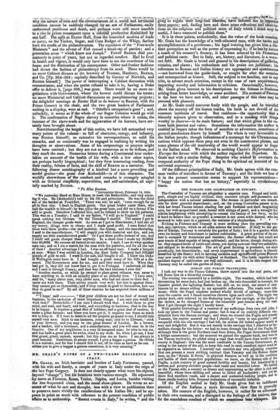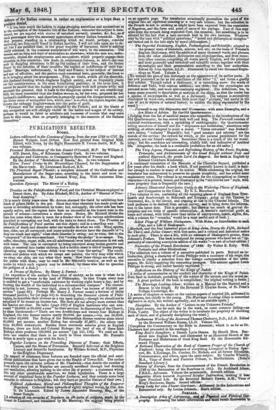Kn. GEALE ' S NOTES OF A TWO-YEARS RESIDENCE IN ITALY.
MR. GEALE, an Irish barrister and brother of Lady Fortescue, passed, with his wife and family, a couple of years in Italy under the reign of the late Pope Gregory. It does not clearly appear what were his objects, beyond "change"; but his locations were various enough. He sojourned by turns at Florence, Rome, Venice, Naples, and Lucca, besides visiting the less frequented cities, and the usual show-places. He wrote an ac- count of what he saw and thought, less with a view to publication than to preserve more vividly the recollections of his Italian life ; and he ap- pears in print as much with reference to the present condition of public affairs as to authorship. "Recent events in Italy," be writes, " and the - -. • — - -- P'`)P'-1 I1PW ho 0 gling to regain their long-loal liberties, have induced me to lveritse these papers; and, finding here and there some reflections and observa- tions on the religious and political state of Italy which I think may be useful, I have ventured to publish them."
It is in these points, undoubtedly, that the value of the book consists. Mr. Geale has the knowledge of a well-educated man, with the tastes and accomplishments of a gentleman ; his legal training has given him a die- tinct perception as well as the power of expressing it; if he has by nature a touch of his country's fluency, it has been sobered by his Protestant and political caste. But in Italy, art, history, and literature, is a worn. out field. Mr. Geale is broad and general in his descriptions of galleries, remains, and places ; his enthusiasm and his praise are judicious; his references to Roman and Italian history are, appropriate and spontaneous —not borrowed from the guide-book, or sought for after the occasion and extemporized at leisure. Still, the subject is too familiar, not to say trite, to attract much attention, except in the case of rare acquirements imparting novelty and information to criticism. Occasionally, however, Mr. Geale gives interest to his descriptions by the fulness or freshness arising from better knowledge, or some accident. His account of &sum is the beat we have met with, and other passages of this class may be perusej.with pleasure.
As Mr. Geale could converse freely with the people, and he travelled about the country off the beaten tracks, his book is not devoid of the common incidents of travel. But residence—the opportunity that a leisurely sojourn gives to observation, and to a meeting with things worthy to observe—is its main feature; and that which gives to the vo. lume both. interest and value. Sometimes the information the author is enabled if; impart takes the form of anecdote or adventure, sometimes of general conclusions drawn by himself. The whole is very favourable to the Italian people; though indications of a contempt for the Ultramontane nations which oppress them peep out even in the commonest phrase, and some gleams of the old mastership of the world would appear to linger in the Italian mind. We observed in noticing Cantu's Reformation in Europe the favour with which the author regarded the Popedom. Mr. Geale met with a similar feeling. Sceptics who wished tti overturn the temporal authority of the Pope clung to the spiritual on account of the universal supremacy.
Of the different principalities of Italy, Mr. Geale agrees with the corn. mon verdict of travellers in favour of Tuscany ; and the little we hear of it in the present commotion seems to support his representations-. "happy the nation that has no history," especially in revolutionary times.
THE TUSCANS AND CULTIVATION IN TUSCANY.
The Contadini of Tuscany are altogether a superior race. Frugal and intelli- gent, simple and yet highly civilized, their manners mingle self-possession and independence with a natural politeness. The women in particular are remark- able for their graceful deportment; and, as the young Contadina passes us by, with her broad Tuscan bonnet shading her pale forehead and dark languishing eyes, her well-proportioned neck, bound with strings of pearl, and a wrought fat- zoletta heightening while attempting to conceal the beauty of her form, we find it hard to believe that so graceful a creature is not some noble damsel, who has
assumed to take part in a pastoral, the costume of a shepherdess. * * •
Nothing in Florence and Tuscany is more striking than the prevailing com- fort, nay, opulence, which on all sides salutes the traveller. If Italy be the gar. den of Europe, Tuscany is certainly the garden of Italy; but it is a garden which owes its beauty and luxuriance to patient cultivation. A great portion of its sur- face is occupied by mountains and marshes; the former offering but small and poor tracts of land capable of being cultivated; and the latter, though during win- ter they support herds of cattle and sheep,yet during summer theyare unhealthy, and obliged to be abandoued. The art of good farming is promoted, not alone practically, but theoretically; and every improvement in agriculture is liberally neavarded by the State; and in farming societies and agrictatural prizes Florence may now nearly vie with either England or Scotland. The lands capable in the smallest degree of cultivation are well cultivated; and it is in this respect that Tuscany may be called the garden of Italy.
ROMAN AND TUSCAN TRAVELLING.
I took my way to the Piazza Colonna, threw myself into the mal posts, and left Rome late on a Saturday evening. The evening was succeeded by a terrible night. The weather, which had been threatening for some days, hadjust broken up; the rain descended in torrents, the thunder pealed, the lightning flashed; but still on we went, our escort of cara- bineera by no means adding to my agreeable reflections. The roads were infa- mous; while the Papal machine seemed wholly devoid of springs; more than once the courier and I found ourselves thrown upon each other. The night was pitchy dark, only relieved by the flickering lamp of the carriage, or the lights of the ostlers, as we changed horses at the miserable post-houses along the road.
How I got through the night I hardly know. * * *
With painful forebodings of a renewal of my sufferings from ruts and jolts, I took my place in the Tuscan mal posts: but it was of an entirely different con- struction from the Roman carriage; and when we crossed the Puglia and entered Tuscany, the courier assured me that I should go "come in una gondola"; and compared with the vile carriage I had left, its motion did indeed appear nearly as easy and delightful. But it was not merely in the carriage that I observed an ,m- mediate change for the better: we had to cross through.the bed of the Paglia, for although this Is the great Northern road from Rome, the Papal Government Wilk a bridge unnecessary; but the moment we gained the opposite bank, and were in the Tuscan territories, we glided along a road that would have done credit to any county in England: this was the more creditable to the Tuscan Government, as, owing to the nature of the soil, to keep this road in sad% excellent repair must be As expensive as laborious. I scarcely can conceive any two adjoining countries that can present a more striking contrast than Tuscany and the Roman States hae, on the."Sirida di Siena," in physical features as well as in the condition and habits of their respective populations: we leave, on the Roman side of the Paglia, a rich country of great natural fertility and beauty, but inhabited by a lawless and poverty-stricken people—bad roads and wretched towns. We behold on the Tuscan side, a country as dreary and unpromising as the other is rich and beautiful; whose loose shifting soil seems to forbid all husbandry;
and yet we
there find excellent roads, and a decent and contented-looking people, and in those sterile-looking hills, frequent indications of successful industry.
Of the English settled in Italy Mr. Geale gives but an indifferent
account ; of the Italians a more favourable view than is generally taken. His censure of the English, however, is rather for an adherence
to their own customs, and a disregard to the feelings of the natives, than for the scandalous conduct of which we sometimes hear whispers. his
defence of the Italian customs is rather an explanation or a hope than a positive deniaL
" It has been much the fashion to make sweeping assertions and accusations as to the corruption of the domestic life of the Italians; whenever the subject is men- tioned, we are regaled with stories of cavalieri serventi, cicesbei, &c. &c., as if such personages were the necessary appendages of every Italian household. Now, that persons standing in a relationship which we would, perhaps, consider equivocal, are frequently found in Italian families, I will not take upon me to de- ny; but I am satisfied that. in the great majority of instances, there is nothing really criminal, in the common acceptation of the word, in the connexion. The women are as vain and fond of admiration as elsewhere, while the men are, unfor- tunately, denied the employments and occupations which properly,engage their attention in free countries: this leads to sentimental ,y,hich the men seek in dangling attentions to fill up the tedium of their lives, 'aria the former forget in the devotion of their cavaliers the negIcct.or indifferenoe Of their hus- bands. Marriage, unfortunately, in Italy and Trinee; is the subject of interest and not of affection; and the parties moat concerned have, generally, the least to do in bringing about the arrangement. This, no doubt, avoids all the discredit:- able husband-hunting which disgraces English society, and so frequently places our fair countrywomen in the most humiliating positions; at the same time, it cannot be denied that the Italian practice is pregnant with still greater evils; and amongst the greatest, that it leads to the dangerous system we are considering. still, we must remember that the Italian woman is, by her own, prepared-for her husband's indifference; and therefore is generally, spared the disappointment, and the bitter sense of unrequited love, which, alas! is so often the vielent impulse that throws the unhappy Englishwoman into the paths of guilt. "Florence was for many years occupied by the French and as the traces of this occupation are still strongly visible in the habits and usages of its society, perhaps it would be fairer to attribute any looseness of morals that may exist there to this cause, than as properly belonging to the manners of the Italians themselves."



























 Previous page
Previous page